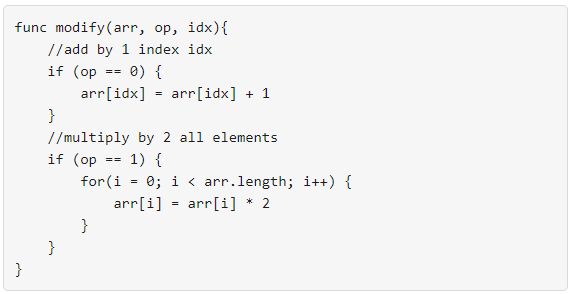Problem
You are given an integer array nums. You have an integer array arr of the same length with all values set to 0 initially. You also have the following modify function:

You want to use the modify function to covert arr to nums using the minimum number of calls.
Return **the minimum number of function calls to make *nums* from **arr.
The test cases are generated so that the answer fits in a 32-bit signed integer.
Example 1:
Input: nums = [1,5]
Output: 5
Explanation: Increment by 1 (second element): [0, 0] to get [0, 1] (1 operation).
Double all the elements: [0, 1] -> [0, 2] -> [0, 4] (2 operations).
Increment by 1 (both elements) [0, 4] -> [1, 4] -> [1, 5] (2 operations).
Total of operations: 1 + 2 + 2 = 5.
Example 2:
Input: nums = [2,2]
Output: 3
Explanation: Increment by 1 (both elements) [0, 0] -> [0, 1] -> [1, 1] (2 operations).
Double all the elements: [1, 1] -> [2, 2] (1 operation).
Total of operations: 2 + 1 = 3.
Example 3:
Input: nums = [4,2,5]
Output: 6
Explanation: (initial)[0,0,0] -> [1,0,0] -> [1,0,1] -> [2,0,2] -> [2,1,2] -> [4,2,4] -> [4,2,5](nums).
Constraints:
1 <= nums.length <= 10^50 <= nums[i] <= 10^9
Solution (Java)
class Solution {
public int minOperations(int[] nums) {
int ops = 0;
for (int bit = 0; bit < 32; bit++) {
boolean nonzero = false;
for (int i = 0; i < nums.length; i++) {
ops += nums[i] % 2;
nums[i] /= 2;
nonzero |= nums[i] > 0;
}
if (nonzero) {
ops++;
} else {
break;
}
}
return ops;
}
}
Explain:
nope.
Complexity:
- Time complexity : O(n).
- Space complexity : O(n).